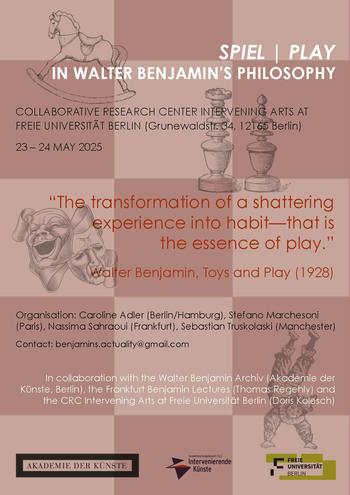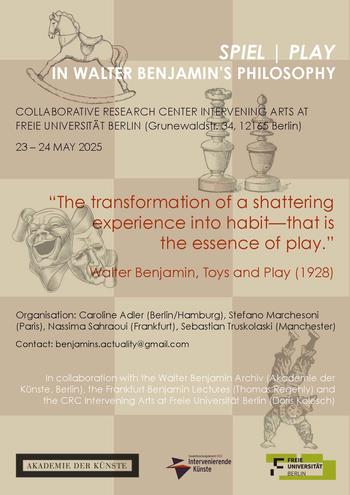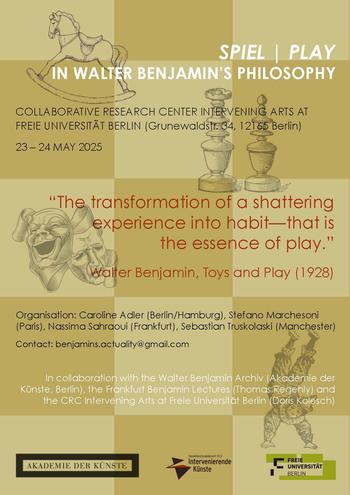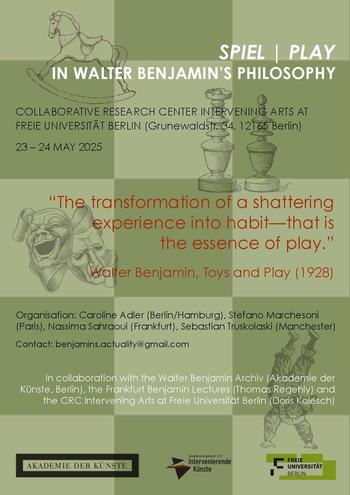Spiel | Play in Walter Benjamin's Philosophy
Spiel | Play in Walter Benjamin's Philosophy
Spiel | Play in Walter Benjamin's Philosophy
Spiel | Play in Walter Benjamin's Philosophy
Event in English spoken language | free admission | registration required | no barrier-free access
“The transformation of a shattering experience into habit—that is the essence of play.”
Walter Benjamin, Toys and Play (1928)
The notion of “play” is a central theme in Walter Benjamin’s work, ranging from children’s games, and the Baroque mourning play, to Brechtian theater, and the famous chess-playing machine at the beginning of his theses on the concept of history. “Play” – as both word and object – assumes importance when Benjamin invokes a “history of the concept of play” to unfold the relationship between reflection, play, and semblance in his book on The Origin of the German Tragic Drama. In addition to play in the area of concrete engagement with theatrical forms, as in Bertolt Brecht’s later works, including his epic theater, play remains of interest to Benjamin as a vital human capacity throughout his life. Play’s ability to “override the orders of experience” (On some Motifs in Baudelaire) transforms it into a site where boundaries are dissolved, thus harnessing new possibilities.
Crucially, Benjamin does not treat “play” and “playing” merely as metaphors or figures of speech. His awareness of contemporary theories of play (by thinkers such as Groos, Gröber, Freud, and Klages) informs his unique approach, situating play within a “world of signs”. Additionally, his later reflections on toys and play are shaped by his engagement with concrete (progressive) pedagogical movements at the turn of the century, along with the educational experiments in the nascent Soviet Union, which Benjamin observed with great interest during his stay in Moscow. For Benjamin, play and playing have an intrinsically transformative and subversive potential that breaches conventional frameworks, including the very notion of linearity and chronology (on stage as well as in history). In this “essence of playing” (Spielzeug und Spielen) lies a glimmer of hope for practicing the utopian, the different, the not-yet-known.
This two-day workshop aims at re-reading the philosophical foundations and historical potentials of Benjamin’s notion of “play”.
For this workshop we will be joined by Erdmut Wizisla (Berlin).
PROGRAMME
Day 1 (May 23)
09:00-09:30Introduction: Organisation Collective and Doris Kolesch 09:30-11:00
Session 1: Theatre and the Play of Gestures
• “Spiel und Reflexion” (Ursprung des deutschen Trauerspiels; GS I, 259-263) / “Play and reflection” (Origin of the German Trauerspiel, 67-72)
• Programm für ein proletarisches Kindertheater (GS II, 763-769) / Program for a Proletarian Children’s Theater (SW 2, 201-206)
• Was ist das epische Theater? (GS II, 534-536) / What Is Epic Theater? (SW 4, 304-305)
Chairs: Sophia Buck, Antonio Roselli
11:00-11:15 Coffee Break
11:15-12:45Session 2: Children’s Plays and Mimetic Faculty
• “Die Mummerehlen” (Berliner Kindheit; GS IV, 260-263) / “The Mummerehlen” (Berlin Childhood, 130-135)
• “Schmetterlingsjagd” (Berliner Kindheit; GS IV, 244-245) / “Butterfly Hunt” (Berlin Childhood, 50-53)
• “Verstecktes Kind” (Einbahnstraße; GS IV, 115-116) / “Child hiding” (One-Way Street; SW 1, 465-466)
• Lehre vom Ähnlichen (GS II, 204-210) / Doctrine of the Similar (SW 2, 694-698)
Chairs: Hannah Sabrina Hübner, Michael Levine
12:45-14:00 Lunch Break
14:00-15:30Session 3: Play, Repetition, Habit
• “Karusselfahrendes Kind” (Einbahnstraße; GS IV, 114-115) / “Child on the carousel” (SW 1, 464)
• “Das Karussell” (Berliner Kindheit; GS IV, 268) / “The Carousel” (Berlin Childhood, 122-123)
• Spielzeug und Spielen (1928) (GS III, 127-132) / Toys and Play (SW 2, 117-121)
• Chichleuchlauchra. Zu einer Fibel (1930) (GS III: 267-272)
Chairs: Karolina Jesién, Stefano Marchesoni
15:30-15:45 Coffee Break
15:45-17:15Session 4: Toys as “Dingwelt”
• “Baustelle” (Einbahnstraße; GS IV, 92-93) / “Construction Site” (SW 1, 449-450)
• Altes Spielzeug (1928; GS IV, 511-515) / Old Toys (SW 2, 98-102)
• Kulturgeschichte des Spielzeugs (1928; GS III, 113-117); The Cultural History of Toys (SW 2, 113-116)
Chairs: Anna Migliorini, Thomas Regehly
17:15-17:30: Coffee Break
17:30-19:00Keynote Address
“Das Immer-wieder-von-vorn-Anfangen. Dreizehn Thesen zu ,Spiel‘ bei Benjamin und Brecht”
Speaker: Erdmut Wizisla
Chair: Caroline Adler
Day 2 (May 24)
Session 5: “Space of play” (Spielraum) and “second technique”
• Das Kunstwerk im Zeitalter seiner technischen Reproduzierbarkeit (zweite Fassung): Fussnoten 4 und 10 (GS VII, 360; 368-369) / The Work of Art in the Age of Its Technological Reproducibility (ed. by M. Jennings): Footnotes 11 (p. 45) and 23 (p. 48-49)
Chairs: Caroline Adler, Daniel Gönitzer
11:00-11:15 Coffee Break
11:15-12:45Session 6: Gambling and work in late capitalism
• Über einige Motive bei Baudelaire, Kap. IX (GS I, 632-637) / On Some Motifs in Baudelaire, Chapter IX (SW 4, 329-332)
• Die glückliche Hand. Eine Unterhaltung über das Spiel (1935; GS IV, 771-777) / The Lucky Hand (The Storyteller, ed. by S. Dolbear, E. Leslie, S. Truskolaski, 187-194)
Chairs: Jacob Bard-Rosenberg, Sebastian Truskolaski
12:45-14:00 Lunch Break
14:00-15:30Session 7: Gambling as innervation and presence of mind
• “[Tele]pathie” (1927-28; GS VI, 187-188)
• “Notizen zu einer Theorie des Spiels” (1929-30; GS VI, 188-191) / “Notes on a Theory of Gambling” (SW 2, 297-298)
• Paris, die Hauptstadt des XIX. Jahrhunderts: “Haussmann oder die Barrikaden” (GS V, 56-57) / “Haussmann, or the Barricades” (Arcades Project, 11-13)
• Aufzeichnung D 3, 4 (GS V, 164; AP, 107)
• Aus Konvolut O: “Prostitution, Spiel” (GS V, 612-642): O 1, 1; O 4, 1; O 11 a, 1; O 12 a, 2; O 13, 1; O 13, 2; O 13, 3; O 13, 4; O 13 a, 4; O 13 a, 5; O 14, 4 / “Prostitution, Gambling” (AP, 489-515)
Chairs: Nassima Sahraoui, Mauricio Gonzalez
15:30-16:00 Coffee Break
16:00-17:30Round Table Discussion: From Mickey to Donald: technological dreams turning into nightmares
Chairs: The Organising Collective with Michael Levine
Sunday morning at 10:30 am: we kindly invite all participants to a collective visit of the exhibition “Der Engel der Geschichte. Walter Benjamin, Paul Klee und die Berliner Engel 80 Jahre nach Kriegsende” (Meeting point: Bode-Museum)
Since the event revolves around close reading sessions, some prior knowledge of Benjamin’s writings is strongly encouraged. Bilingual, German-English copies of the texts will be made available. To facilitate the discussion, the number of participants for this workshop is limited.
If you would like to participate, please send a message and a brief biographical note to the organisers: benjamins.actuality@gmail.com
Organisation: Caroline Adler (Berlin/Hamburg), Stefano Marchesoni (Paris), Nassima Sahraoui (Frankfurt), Sebastian Truskolaski (Manchester)
In collaboration with the Walter Benjamin Archiv, Akademie der Künste, Berlin, the Frankfurt Benjamin Lectures (Thomas Regehly), and the Institute for Theater Studies at Freie Universität Berlin (Doris Kolesch from project B05)
Time & Location
May 23, 2025 - May 24, 2025
SFB 1512 Intervenierende Künste, Seminarraum, Grunewaldstr. 34, 12165 Berlin
Further Information
If you would like to participate, please send a message and a brief biographical note to benjamins.actuality@gmail.com.



